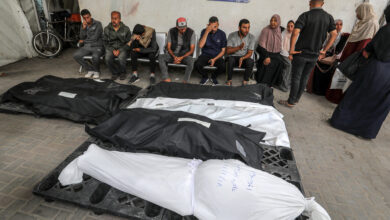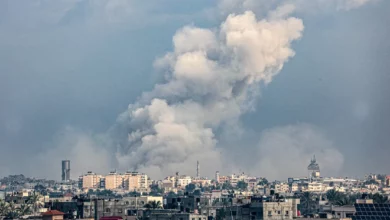Sunday’s arrest of an Israeli intelligence officer occupies center stage in Monday’s papers. As always, the difference in coverage between state-run and independent newspapers is stark.
Al-Ahram’s headline, “Israeli officer participated in the revolution to divide the people and the army,” combined with the subheading “Spy tried to recruit people to spread chaos and insecurity,” would seem to confirm widespread suspicions that external forces are responsible for Egypt’s internal divisions.
Meanwhile, Al-Akhbar’s headline relies on nationalistic overtones, portraying the incident as a victory against Egypt’s frequent nemesis: “Painful Egyptian blow to Mossad,” it says, while alleging that the suspect sought to foment sectarian strife in Imbaba and at Maspiro.
State-run newspapers Al-Akhbar and Al-Ahram feature the incident prominently on their front pages, while independent dailies Al-Dostour and Al-Shorouk relegate the news to the corners. State-run newspapers report government allegations as fact while the independent dailies report on the allegations themselves. Inexplicably, the liberal daily Al-Wafd fails to cover the arrest at all.
In the few words devoted by Al-Shorouk to the incident, the article headlined “Israeli officer arrested… the primary suspect in the Hussein explosions” simultaneously addresses the arrest of an alleged Palestinian Islamist affiliated with Al-Qaeda who is accused of involvement in blowing up a Cairo theater in early 2009. Al-Dostour reports, with similar detachment, “Arrest of Israeli officer downtown.” Unlike in state-run papers, both sources report on the affair without losing sight of the fact that little has been proven and the suspect is so far not convicted.
Al-Dostour’s main headline features “important documents” prepared by Muslim Brotherhood leader Khaled Abdel Qader Owda, calling for Egypt’s disparate Islamic groups to form an alliance in preparation for parliamentary elections slated for September. According to the paper, Owda admitted that he had extended the invitation to various Islamic groups but had “not yet received an official response to the document.”
Al-Dostour does not reveal who decided to leak the documents, but the decision could represent a move to pressure Islamic groups into uniting against liberals who, as the document says, “seek to push the military to continue ruling the country” and exclude Islamists from power.
Al-Shorouk’s major headline concerns the latest development in the trial of former Interior Minister Habib al-Adly and other police officials accused of killing protesters during the 25 January revolution; disagreements over whether the trial should be televised resulted in a leading judge being transferred from the case. The article contrasts with the one underneath, whose headline reads, “High school student request that the police return to their posts.”
Al-Shorouk’s editorial decision to place two headlines – one appealing to the police to return to their posts, and the other announcing latest developments in Adly's case – highlights continuing tension between two seemingly opposing objectives: restoring the role of police in maintaining law and order while prosecuting police figures for past wrongdoings.
In Al-Shorouk, Mostafa Kamel al-Sid, a political science professor at Cairo University, reflects on his recent visit to Iran, during which he met with Iranian intellectuals and political dissidents. He concludes that he would not be surprised if, were Islamists to gain power in Egypt, citizens’ standards of living would rise and Egypt would advance scientifically, as was the case of Iran following the1979 Iranian revolution. He argues that such benefits, however, would come at the price of a loss of art and literature, as Egyptian Islamists would severely curtail personal freedoms just as religious authorities do in Iran.
However, if Islamists came to power in Egypt, restrictions to personal freedom would be more severe than they are now in Iran, he says, because “Egyptian Islamist social thought is certainly less advanced than religious Iranian social thought, especially in regards to the freedom of women.”
Writing in Al-Wafd, Hassan al-Haiwan, president of Moqattam Organization for Culture and Discussion, addresses the issue of renewed sectarianism in Egypt. He argues that sectarian violence is largely the result of liberal attempts to circumvent Egypt’s recent constitutional referendum by postponing parliamentary elections. Amending what was decided in the referendum, he says, represents the “destruction of the will and respect of the people,” and therefore promotes the “destruction of any attempt at peaceful coexistence.”
He also says sectarian violence in Egypt is the result of Western hegemony and aid to Israel. Western-Israeli dominance requires using secularists against Islamists to “thwart a democratic transition… that could achieve independence and a renaissance,” especially in Egypt, he says. Haiwan does not mention the latest spy incident, most likely because news of the affair emerged after his article was submitted.
Egypt's papers:
Al-Ahram: Daily, state-run, largest distribution in Egypt
Al-Akhbar: Daily, state-run, second to Al-Ahram in institutional size
Al-Gomhurriya: Daily, state-run
Rose al-Youssef: Daily, state-run
Al-Dostour: Daily, privately owned
Al-Shorouk: Daily, privately owned
Al-Wafd: Daily, published by the liberal Wafd Party
Al-Arabi: Weekly, published by the Arab Nasserist party
Youm7: Daily, privately owned
Sawt al-Umma: Weekly, privately owned




